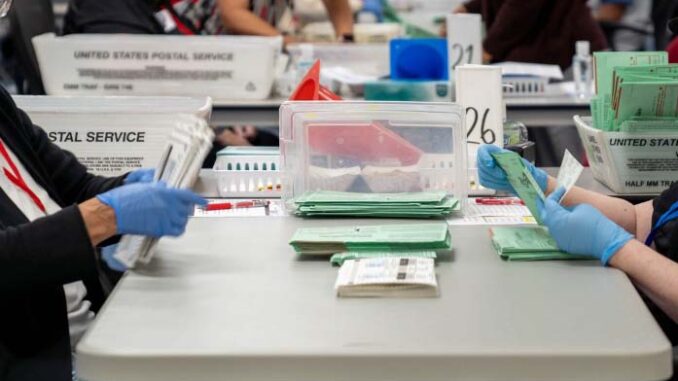
During the 2022 election cycle, then Senatorial candidate, Major General Michael “Mick” McGuire (ret), blasted then Arizona Attorney General Mark Brnovich for ignoring the threats to election integrity created by the Uniformed and Overseas Citizens Absentee Voting Act (UOCAVA).
The former Adjutant General of the Arizona National Guard lashed out at Brnovich for failing to “investigate credible concerns involving ballots cast through Arizona’s UOCAVA system.
Finally say election integrity activists, someone is taking action.
Congressman Abe Hamadeh (AZ-08) promised the voters in Congressional District 8 that he would take swift action to increase confidence in our nation’s elections so last week, he introduced the Proving Residency for Overseas Voter Eligibility (PROVE) Act.
The purpose of the PROVE Act is to amend the Uniformed and Overseas Citizens Absentee Voting Act (UOCAVA) to require non-military overseas citizens to prove their current residency in a state they in which they are attempting to vote.
If they are unable to prove a current resident status by either themselves, their spouse, parent, or legal guardian, U.S. citizens may still vote a federal ballot only in the District of Columbia.
Currently, under UOCAVA, states are forced to let U.S. citizens living overseas to vote in federal elections based on their last state residence. In many cases, those claiming resident status in a state have not been in that state, nor do they have any ties to it, undermining election integrity.
Even more shockingly, 39 states permit individuals who have never resided in the United States to cast ballots in our state elections. This policy applies in several crucial swing states who often decide presidential elections, including Arizona, Georgia, Michigan, Nevada, New Hampshire, North Carolina, and Wisconsin.
The guru of election integrity, Hans von Spakovsky, of the Election Law Reform Initiative and Senior Legal Fellow at the Edwin Meese III Center for Legal and Judicial Studies, told The Federalist that Hamadeh’s bill is a “step in the right direction.”
“The loophole in UOCAVA allows citizens living overseas, with no current ties to a state, to arbitrarily choose where their vote counts. This threatens electoral integrity and is an affront to everyone who believes in fair and free elections,” stated Hamadeh. “The PROVE Act will close this loophole and go far to restore trust in our elections.”
“In Arizona, we have seen what the mismanagement of voter rolls, failed election infrastructure, and corrupt courts can do to destroy voter confidence and faith in our system overall. Since taking office, I have introduced legislation to address some of the most egregious practices and close the most glaring loopholes in our election system,” stated Hamadeh.
“I call on my colleagues to join me and support the PROVE Act so that we can rebuild citizens’ trust in our elections through comprehensive and meaningful election integrity legislation,” said Hamadeh.
Congressman Tim Burchett (TN-02) and Congressman Andy Ogles (TN-05) are original cosponsors of this critical legislation.
According to McGuire, “a manager involved with the Arizona Senate’s audit of Maricopa County’s 2020 ballots, testified before the Senate that nearly 10,000 UOCAVA ballots accepted by the Maricopa County Recorder’s Office were presented without an evident chain of custody. These ballots included those expedited by the Postal Service as well as printouts of ballots submitted by fax, email, and an internet portal. The County Recorder’s Office later confirmed the total number of UOCAVA ballots received in 2020 was 10,396; a 68% increase over the 6,180 UOCAVA ballots cast in 2016.”
RELATED ARTICLES:
Hamadeh Introduces Bill to Kill ‘Ranked Choice Voting Scheme’ on Federal Level
Brnovich Ignoring Credible Concerns About Ballots Cast Through Arizona’s Overseas Internet Portal
